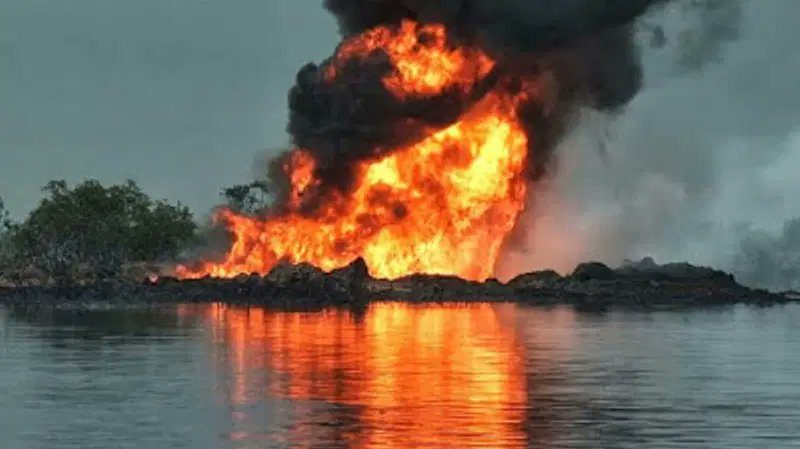
News
3rd explosion rocks gas facility in Rivers State, Nigeria

On Sunday, March 23, 2025, a 3rd explosion rocked a gas facility in Rivers State, Nigeria, sending shockwaves through the Niger Delta region. This latest incident at the Soku oil facility in Akuku Toru Local Government Area is the third explosion in the state within a week.
Reported by the Youths and Environmental Advocacy Centre (YEAC-Nigeria), the blast has raised serious concerns about safety, security, and the stability of Nigeria’s oil and gas infrastructure. With trending keywords like “explosion,” “Rivers State,” and “gas facility” dominating headlines, this event underscores ongoing challenges in the region.
Details of the 3rd explosion
The explosion at the Soku oil facility happened early Sunday morning, with fireballs lighting up the sky and flames still burning hours later. YEAC-Nigeria, led by Dr. Fyneface Dumnamene Fyneface, confirmed the incident through youth volunteers on the ground. The facility, managed by Nigeria Liquefied Natural Gas (NLNG) Limited, is a vital part of the country’s gas supply chain.

Located 24 miles from Port Harcourt in a remote area accessible only by water or air, the cause of the blast remains unclear. Experts suggest it could be due to equipment failure, sabotage, or an attack, but investigations are yet to provide answers.
This isn’t the first explosion this week. Earlier blasts hit the Trans Niger Pipeline in Bodo and a pipeline in Ogba/Egbema/Ndoni, signaling a troubling pattern. The Soku facility, valued at over N25 billion, plays a key role in supplying gas to NLNG’s operations. Its history includes a 2019 court battle won by Rivers State against Bayelsa State over ownership, making it a prized asset.
| RELATED NEWS: |
| Sole Administrator Ibok-Ete Ibas lands in Rivers, tackles security |
| Senate greenlights emergency rule in Rivers: what’s next? |
| PDP rejects emergency rule in Rivers State |
A Week of Chaos in Rivers State
The Niger Delta has been on edge as explosions continue to disrupt oil and gas operations. Just days ago, the Trans Niger Pipeline, run by Shell Petroleum Development Company (SPDC), exploded in Bodo, Gokana Local Government Area.
Another blast followed at a pipeline manifold in Ogba/Egbema/Ndoni. Police have detained suspects linked to the Bodo incident, hinting at possible sabotage. These events have put Nigeria’s oil industry—a backbone of its economy—under strain, with losses piling up and communities living in fear.
Government Steps In
On March 18, 2025, President Bola Tinubu declared a six-month state of emergency in Rivers State. He suspended Governor Siminalayi Fubara, his deputy, and the state assembly, blaming them for failing to protect oil infrastructure.
The decision came after youth groups threatened action, raising tensions. Tinubu’s move has sparked debate, with some calling it necessary and others seeing it as political overreach. Either way, it reflects the growing urgency to secure Nigeria’s energy sector.

Calls for answers and accountability
YEAC- Nigeria is demanding a full investigation into the Soku explosion. They’ve urged the National Oil Spill Detection and Response Agency (NOSDRA) to launch a Joint Investigation Visit (JIV) to pinpoint the cause.
Under the Petroleum Industry Act (PIA) 2021, those responsible could face stiff penalties. “We need to know who or what is behind this,” said Dr. Fyneface. “Our oil and gas facilities are too important to keep losing like this.” The group warns that without action, more explosions could follow.
Why this matters
The Niger Delta has long battled oil theft, pipeline vandalism, and environmental damage. These explosions worsen an already tough situation. Nigeria, a top oil exporter, relies heavily on its oil and gas sector for revenue. Each incident means lost production, damaged equipment, and risks to lives and the environment.
Local communities, already struggling with pollution and poverty, bear the brunt. The Soku explosion, like those before it, highlights the need for better security and maintenance of these critical sites.
What’s next?
As authorities investigate, all eyes are on Rivers State. Will they find the cause—be it human error, mechanical failure, or sabotage? Can Nigeria protect its oil and gas facilities from further attacks? T
He answers will shape the region’s future. For now, the flames at Soku serve as a grim reminder of the challenges ahead. The government, oil companies, and communities must work together to stop this cycle of destruction.
This latest explosion isn’t just a local story—it’s a national crisis. With Nigeria’s economy and millions of livelihoods at stake, the pressure is on to act fast and decisively.




























